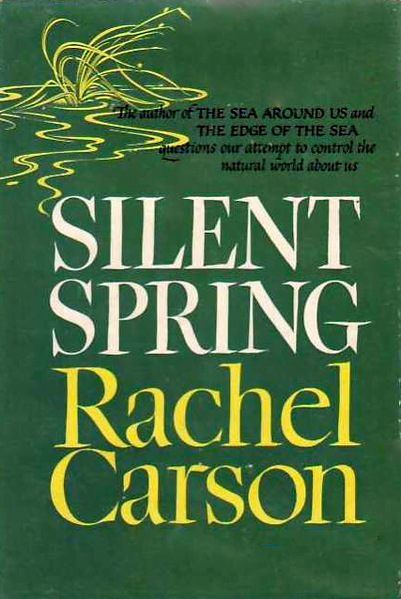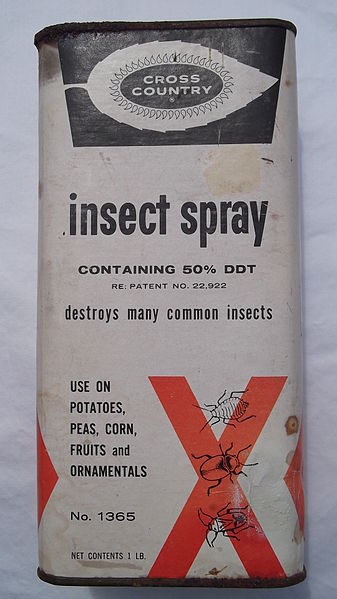I first learnt about the American biologist Rachel Carson’s book Silent Spring (1963) from my lecturer of Horticultural Chemicals which I was studying at Burnley Horticultural Campus. We were learning about the development of the post WW II modern man-made insecticides – the organophosphates. Carson discovered that many bird species was on the verge of extinction, due to their reproductive ability being affected by broad acre spraying of DDT. Either their nests were empty or the eggs failed to hatch or the hatchlings died a few days after they were born.
 This book quite controversial at the time and the chemical companies were not happy with her pointing out the negative effects of these new wonder chemicals. These chemicals were seen as god sends as they were going to fix all pest and disease problems that humans had never been able to control before. In America they were used widely to control insects like mosquitoes, lice, elm leaf beetle and were often applied by aerial spraying. This meant that 1000s of acres were contaminated by these chemicals.
This book quite controversial at the time and the chemical companies were not happy with her pointing out the negative effects of these new wonder chemicals. These chemicals were seen as god sends as they were going to fix all pest and disease problems that humans had never been able to control before. In America they were used widely to control insects like mosquitoes, lice, elm leaf beetle and were often applied by aerial spraying. This meant that 1000s of acres were contaminated by these chemicals.
However, whole populations of birds and fish were being poisoned due the chemicals getting into the food chain via wind, soil or water. Carson critics said that in an indirect way she has caused many deaths because DDT was banned and wasn’t able to be used to eliminate the mosquitoes that carried malaria.
I don’t know why I didn’t read it back then but it wasn’t until recently, I borrowed it from the library and started reading it. Well, I can’t believe it. This book was written exactly 50 years ago and we haven’t learnt the lessons that Carson talked about which is very depressing.
 There is a chilling chapter where Carson talks of a town in America where there were no bird songs in spring. The previous spring had been full of songs and but after several years of DDT being sprayed by plane over the elm trees, the spring fell silent. Carson described it as eerie and terrifying.
There is a chilling chapter where Carson talks of a town in America where there were no bird songs in spring. The previous spring had been full of songs and but after several years of DDT being sprayed by plane over the elm trees, the spring fell silent. Carson described it as eerie and terrifying.
Carson pointed out that all the gardening products that we buy and don’t give a second thought to, should not be available to the general public as they have no idea how dangerous they are. I have often thought of this. The range of poisons on the shelf is mind boggling and most gardeners little thought to what happens to them once they enter the environment. I am also dismayed at how easy they are to buy, but how hard they are to dispose of safely. I have taken gardening chemicals to a depositing facility and you have to book in your delivery and THEN pay per kg to get rid of them! I think it cost my client about $35.00.
 I can’t recommend strongly enough that everyone should read this book. It is as relevant today as when it was first published as we are still poisoning our plant with chemicals that can reside in the soil for years, move up through the food chain ending up in us being stored in our body fat or organs such as our livers.
I can’t recommend strongly enough that everyone should read this book. It is as relevant today as when it was first published as we are still poisoning our plant with chemicals that can reside in the soil for years, move up through the food chain ending up in us being stored in our body fat or organs such as our livers.
When will we learn?
Hi Sandi,
I have a Readers Digest guide to gardening from the 50s or 60s that recommends treating any and all home veggie garden pests with DDT. For a person born 2 years before DDT was totally banned in Australia, seeing its use so heartily encouraged on the page was sobering!
My personal view is that pesticides are all too readily reached for by a lot of people – they’ve become the first line of defence rather than a last resort.
Hi James
That is a gem of a copy and I hope you treasure it as part of history. Thank god, we don’t use DDT like we used too. However, we are lucky being in the 1st world and not in 3rd world countries where often these chemicals get dumped and still used. Reading Silent Spring has made me stop and think what I am doing. I now think very carefully when I am deciding whether to use a systemic like Confidor which kills the bees. I don’t want to kill the bees or poison the birds. Cheers Sandi
……………… and I read on the weekend that DDT is again being used to kill mosquitoes to stop malaria — I cannot remember which 3rd world country it was.
Not wise as there will be a lot of colatorial damage.